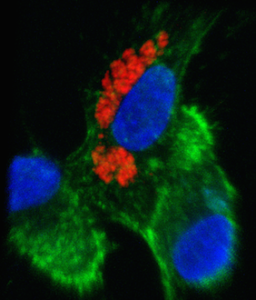Zika virus can infect and replicate in immune cells from the placenta, without killing them, scientists have discovered. The finding may explain how the virus can pass through the placenta of a pregnant woman, on its way to infect developing brain cells in her fetus.
The results were published in Cell Host & Microbe.
“Our results substantiate the limited evidence from pathology case reports,” says senior author Mehul Suthar, PhD, assistant professor of pediatrics at Emory University School of Medicine. “It was known that the virus was getting into the placenta. But little was known about where the virus was replicating and in what cell type.”
Scientists led by Suthar and Emory pediatric infectious disease specialist Rana Chakraborty, MD, found that Zika virus could infect placental macrophages, called Hofbauer cells, in cell culture. The virus could also infect another type of placental cell, called cytotrophoblasts, but only after a couple days delay and not as readily. Other researchers recently reported that syncytiotrophoblasts, a more differentiated type of placental cell than cytotrophoblasts, are resistant to Zika infection.
The cells for the experiments were derived from full-term placentae, obtained from healthy volunteers who delivered by Cesarean section. The level of viral replication varied markedly from donor to donor, which hints that some women’s placentae may be more susceptible to viral infection than others. Read more





